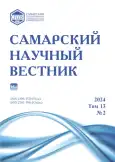Проектирование образовательного процесса аспирантуры: интеграция фрактально-резонансной методологии и педдизайна
- Авторы: Пивнева С.В.1, Гребенникова В.М.2, Никитина Н.И.3, Комарова Е.В.4
-
Учреждения:
- Российский государственный социальный университет
- Кубанский государственный университет
- Московский университет имени А.С. Грибоедова
- Российская академия народного хозяйства и государственной службы
- Выпуск: Том 13, № 2 (2024)
- Страницы: 208-215
- Раздел: Педагогические науки
- URL: https://journal-vniispk.ru/2309-4370/article/view/271372
- DOI: https://doi.org/10.55355/snv2024132309
- ID: 271372
Цитировать
Полный текст
Аннотация
Современная система образования характеризуется возрастающими требованиями к качеству и результативности образовательного процесса (в том числе и в аспирантуре), что актуализирует необходимость использования научно обоснованных методологических подходов к проектированию и реализации образовательных программ. В этом контексте особое значение приобретает интеграция фрактально-резонансной методологии (ФРМ) и концепции педагогического дизайна (ПД). В статье рассмотрены механизмы синтеза необихевиористического, когнитивистского и конструктивистского подходов в рамках теории и практики педдизайна, а также три ключевых подхода к педпроектированию в концепции педдизайна: «от задачи», «от типа деятельности» и «от образовательных результатов», проанализированы их особенности, преимущества и ограничения. Фрактально-резонансная методология (ФРМ) проектирования образовательного процесса основывается на принципах, заимствованных из теории фракталов и концепции резонанса. В статье рассмотрена сущность данной методологии, ее ключевые аспекты, принципы, возможности и дидактические механизмы реализации в образовательном процессе аспирантуры. В содержании статьи анализируется, как применение четырёхкомпонентной модели дизайна обучения (4С/ID), основанной на теории когнитивной нагрузки Эдварда Свеллера и теории мультимедийного обучения Ричарда Майера, может улучшить образовательный процесс в аспирантуре и помочь обучающимся эффективно справляться с изучаемыми темами.
Полный текст
Открыть статью на сайте журналаОб авторах
Светлана Валентиновна Пивнева
Российский государственный социальный университет
Email: tlt-swetlana@yandex.ru
кандидат педагогических наук, доцент кафедры информационных технологий, искусственного интеллекта и общественно-социальных технологий цифрового общества
Россия, МоскваВероника Михайловна Гребенникова
Кубанский государственный университет
Автор, ответственный за переписку.
Email: vmgrebennikova@mail.ru
доктор педагогических наук, профессор, заведующий кафедрой педагогики и психологии
Россия, КраснодарНаталья Ивановна Никитина
Московский университет имени А.С. Грибоедова
Email: nn0803@mail.ru
доктор педагогических наук, профессор кафедры общей психологии и педагогики
Россия, МоскваЕкатерина Владимировна Комарова
Российская академия народного хозяйства и государственной службы
Email: evkomarova@mail.ru
доктор педагогических наук, доцент, профессор кафедры информатики и математики
Россия, МоскваСписок литературы
- Абдуллина Л.Б., Маджуга А.Г., Синицина И.А. Фрактальная педагогика: теория, методология и практика: монография. М.: Университетская книга, 2016. 320 с.
- Маджуга А.Г., Синицина И.А., Абдуллина Л.Б. Фрактально-резонансный подход как методология постнеклассического гуманитарного знания // Высшее образование сегодня. 2014. № 11. С. 61–66.
- Ушаков А.А. Фрактальная методология личностно-профессионального саморазвития педагога в интегративной образовательной среде [Электронный ресурс] // Мир науки. Педагогика и психология. 2020. Т. 8, № 2. https://mir-nauki.com/pdf/58pdmn220.pdf.
- Соколов А.В. Применение фрактальной методологии в гуманитарных науках // Время науки. 2016. № 3. С. 12–18.
- Ефимова Е.А., Корешникова Ю.Н., Давлатова М.А. Педагогический дизайн: российская и зарубежная исследовательская повестка / под науч. ред. Е.В. Чернобай. М.: НИУ ВШЭ, 2022. 44 с.
- Mangaroska K., Giannakos M. Learning analytics for learning design: a systematic literature review of analytics-driven design to enhance learning // IEEE Transactions on Learning Technologies. 2018. Vol. 12, iss. 4. P. 516–534. doi: 10.1109/tlt.2018.2868673.
- Power R. Everyday Instructional design: a practical resource for educators and instructional designers. Sydney: Power Learning Solutions, 2023. 303 p.
- Mattar J. Constructivism and connectivism in education technology: active, situated, authentic, experiential, and anchored learning // Revista Iberoamericana de Educación a Distancia. 2010. Vol. 21, iss. 2. P. 201–217. doi: 10.5944/ried.21.2.20055.
- Асанов С.А., Акименко Г.В. Педагогический дизайн и педагогическое проектирование как эффективные технологии организации образовательного процесса в вузе [Электронный ресурс] // Дневник науки. 2020. № 8 (44). http://www.dnevniknauki.ru/images/publications/2020/8/pedagogics/Asanov_Akimenko.pdf.
- Вольхин С.Н., Васильева Т.В., Гребенникова В.М., Ильгов В.И., Квитковская А.А., Комарова Е.В., Никитина Н.И., Пивнева С.В., Романова Е.Ю., Федосов А.Ю. Совершенствование качества непрерывной профессиональной подготовки специалистов социономического профиля: колл. монография. М.: Перспектива, 2022. 323 с.
- Гришина П.Ю. Применение педагогического дизайна при разработке программ профессионального обучения для руководителей высшего звена управления // Лидерство и менеджмент. 2016. Т. 3, № 1. С. 33–50. doi: 10.18334/lim.3.1.35022.
- Мельников В.А., Синицина И.А., Синицын И.А. Концептуальные основы педагогического дизайна: фрактально-резонансный подход // Наука о человеке: гуманитарные исследования. 2016. № 2 (24). С. 118–124. doi: 10.17238/issn1998-5320.2016.24.118.
- Alammary A., Sheard J., Carbone A. Blended learning in higher education: three different design approaches // Australasian Journal of Educational Technology. 2014. Vol. 30, № 4. Р. 440–454. doi: 10.14742/ajet.693.
- Van Merriënboer J.J.G., Sweller J. Cognitive load theory and complex learning: recent developments and future directions // Educational Psychology Review. 2005. Vol. 17, № 2. P. 147–178. doi: 10.1007/s10648-005-3951-0.
- Sweller J., van Merriënboer J.J.G., Paas F. Cognitive architecture and instructional design: 20 years later // Educational Psychology Review. 2019. Vol. 31, № 2. P. 261–292. doi: 10.1007/s10648-019-09465-5.
- Martin F., Ritzhaupt A.D. Standards and competencies for instructional design and technology professionals // Design for Learning: Principles, Processes, and Praxis / eds. J.K. McDonald, R.E. West. EdTech Books, 2020. P. 265–273.
- Макаренко А.А. Педагогический дизайн как средство повышения эффективности организации учебного процесса // Вестник Костромского государственного университета. Серия: Педагогика. Психология. Социокинетика. 2017. Т. 23, № 4. С. 13–16.
Дополнительные файлы






